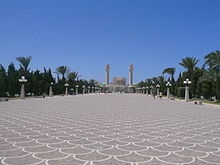Habib Bourguiba
Habib Bourguiba ( Arabic الحبيب بورقيبة al-Ḥabīb Bū Ruqaiba , Tunisian-Arabic Ḥabīb Būrgība ; * August 3, 1903 in Monastir ; † April 6, 2000 ibid) was the first President of the Tunisian Republic between 1957 and 1987 .
childhood
Habib Bourguiba was born in Monastir on August 3, 1903. He came from a medium-sized family. His father was an army officer. He was the youngest of eight siblings.
education
Habib Bourguiba attended primary school in Sadikienne as a child, went to the Collège Sadiki in Tunis and graduated from the Lycee Carnot de Tunis in 1924. In the same year he moved to Paris, where he graduated from the Sorbonne in law and political science in 1927 . In the same year he married the French Mathilde Lorrain, born in Saint-Maur-des-Fossés . Also in 1927 she gave birth to a son, Habib Bourguiba Jr. II , who later became Foreign Minister under Bourguiba .
The pursuit of independence
In 1933 he founded a magazine around which the Tunisian independence movement was formed. From this group he founded - initially still a member of the Destur party - after his studies on March 1, 1934, the Neo Destur party , which advocated Tunisia's independence from France . In 1947 he moved to Egypt and represented the Magreb in the newly founded Arab League . He later returned to France and was imprisoned in France several times, but remained a recognized leader of his party, which represented the radical wing of Tunisian nationalism. During his last prison sentence, Bourguiba was unofficially negotiating the independence of Tunisia with the French government. He was released in 1955, returned to Tunisia in June 1955 and ousted his rival Salah ben Youssef from the party leadership.
Independence and presidency

On March 20, 1956, France had to give Tunisia independence. Initially Prime Minister, Bourguiba became the first President of the Republic of Tunisia , which was proclaimed on July 25, 1957, after the ousting of King Muhammad VIII . He pursued an authoritarian style of government, through which he tried to regulate almost all areas of life of his subjects. In 1975 he was confirmed for life in his office. Despite tensions with France over the issue of troop withdrawal from Tunisia and the expropriation of foreign property, Bourguiba pursued a western-oriented policy.
Comparable to Mustafa Kemal Ataturk , Bourguiba saw Islamists as an existential threat to the essence of the Tunisian state. He saw the promotion of secularism closely connected with the mission and nature of the state. And because Islamists disagreed with him on this fundamental political principle, they were denied access to the political system in its entirety. Bourguiba had no inclination to compromise here: after bomb attacks in vacation areas, he advocated large-scale executions of Islamists. He was also often an opponent of Muslim religious traditions, so he spoke of the veil as a "hideous shred". After he came to power, he expropriated real estate in the hands of Islamic institutions, converted the jurisdiction determined by religious norms into a secular legal system, and enacted secular civil law.
In 1961, Bourguiba's first marriage was divorced and the following year he married Wassila Ben Ammar (died 1999), who came from an influential Tunisian family. This marriage was divorced in 1986, but before that Ammar practically exercised the Tunisian official business, as Habib Bourguiba increasingly no longer took part in political life due to old age.
In 1981, one-party rule was weakened and opposition parties were allowed.
Disempowerment
In November 1987, Zine el-Abidine Ben Ali deposed Bourguiba for reasons of age and placed him under house arrest. Ben Ali became Tunisia's new president on November 7, 1987.
The city of Menzel Bourguiba and streets in many cities in Tunisia were named after Habib Bourguiba , including the famous avenue Habib Bourguiba in the capital Tunis. In addition, Monastir International Airport and Monastir Railway Station are named after the former president.
In Bourgiba's honor and memory, a mosque ( Dschâmi 'Burqîba ) and a mausoleum ( Turbat Âl Burqîba with a permanent exhibition on Habib Bourguiba) with a huge forecourt were built in his native Monastir during his lifetime .
literature
- Habib Bourgiba, Roger Stephane: La Tunisie de Bourguiba. September entretiens avec le président de la République tunisienne . Plon , Paris 1958 (French).
- Sophie Bessis, Souhayr Belhassen: Bourguiba , Groupe Jeune Afrique, Paris 1989, ISBN 2-85258-390-9 (= Jeune Afrique livres ); New edition: Elyzad, Tunis 2012, ISBN 978-9-973580-44-3 (French).
Web links
- Literature by and about Habib Bourguiba in the catalog of the German National Library
- http://www.bourguiba.com/ (English)
- http://news.bbc.co.uk/1/hi/obituaries/703907.stm (English)
- http://www.tunisie.online.fr/bourguiba/ (French)
- Obituary: "Habib Burgiba" . In: Der Spiegel . No. 15 , 2000 ( online - April 10, 2000 ).
Individual evidence
- ↑ Tunis: We love the Germans . The mirror 27/1950
- ↑ Samy Ghorbal, Bourguiba Proclame "sa" République Jeune Afrique, July 21, 2003
- ↑ Michael Koplow: Why Tunisia's Revolution Is Islamist-Free . Foreign Policy, Jan. 11, 2011
| personal data | |
|---|---|
| SURNAME | Bourguiba, Habib |
| ALTERNATIVE NAMES | حبيب بورقيبة (Arabic) |
| BRIEF DESCRIPTION | Tunisian President |
| DATE OF BIRTH | August 3, 1903 |
| PLACE OF BIRTH | Monastir (Tunisia) |
| DATE OF DEATH | April 6, 2000 |
| Place of death | Monastir (Tunisia) |





